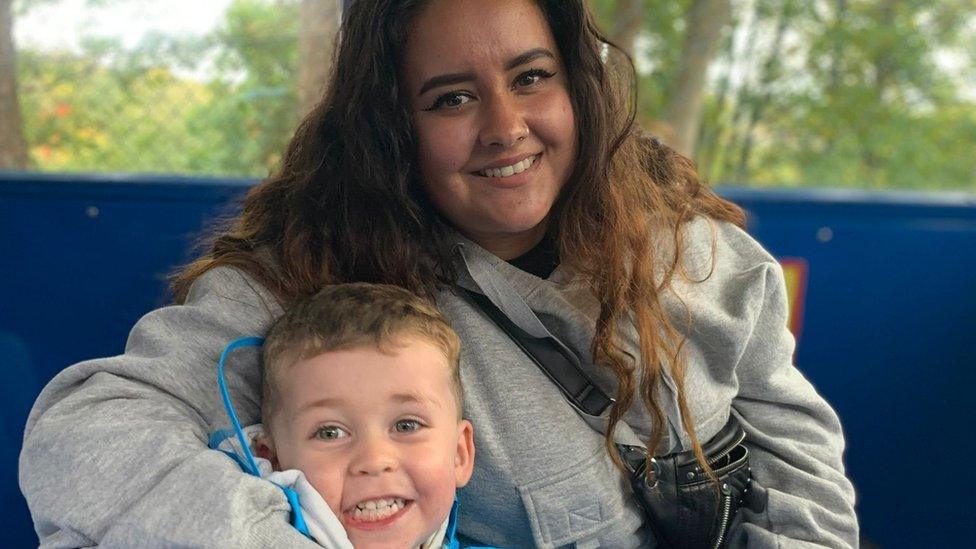First-time buyers surge: 'I couldn't keep paying rent'
- Published

Jake Olenick, 24, is spending almost two-thirds of his take-home pay renting a London flat but he started to get on the property ladder last year.
A new job, rigorous saving and "lucky family circumstances" have enabled him to buy a share of a flat in Kilburn.
Jake is not alone in managing to get a foot on the housing ladder in 2021.
Figures from mortgage lender Halifax suggest there were a record number of first-time buyers last year, despite rising house prices and falling affordability.
Jake, who is originally from New York, graduated from Oxford University and got a job in Oxford working as a games developer in 2019.
Six months ago, he landed a software development job in London and moved into a West Hampstead flat with his girlfriend.
That relationship broke down in October and Jake started to pay all of the rent, which worked out at about 60% of his take-home pay.
"I couldn't keep paying that much in rent and I already knew that it's almost always much better to buy," he said.
So he started the ball rolling on buying 40% of a flat in Kilburn, sharing ownership with a housing association. In total, he'll be paying 35% of his salary on rent, mortgage and service charge when he moves in.
He said one of the main reasons he was able to do this was "extremely lucky family circumstances".
His parents had been saving for him to go to a US university, which was much more expensive than a UK one, and they were able to cover his fees at Oxford.
So when he left, he had no student loans, which helped him when viewing properties.
He also managed to put aside money from his job and has been saving birthday and Christmas money his whole life.
Jake is really looking forward to moving into his new flat.
"I'm very excited!" he says. "I'll be able to put up posters, make repairs, the oven door will close, I'll be able to sleep because the windows are insulated, triple-glazed even!
"I'll be able to afford a weekend away, maybe I'll be able to afford a keyboard so I can play piano again. All sorts of things!"
First-time buyer boom
There were more than 400,000 people buying their first home in 2021, up 35% from the previous year, the Halifax said. That rate dropped by 13% in 2020, when the number of Halifax buyers was about 300,000.
A stamp duty holiday that started in 2020 saw house buyers rush to pick up properties - although first-time buyers were not part of this stampede.
However, this meant a number of so-called "first-rung" homes came on to the market, which first-time buyers took advantage of in 2021, despite hikes in property prices.
Esther Dijkstra, mortgage director at Halifax, said: "There were a number of factors influencing home-buying decisions in 2021.
"While working from home and the 'race for space' was key for many, particularly movers, it's clear that the stamp duty holiday increased the availability of first-rung homes as others moved up the ladder."
The average age of first-time buyers rose to 32, up from 29 in 2011. Ms Dijkstra said that this rise in average age was mostly due to "the need to save a significant deposit to get on the housing ladder".
The average buyer used a £53,935 deposit on a first property costing £264,140.
Because of difficulties raising a deposit, the gap between the purchase price and the deposit widened in every region in the UK, Ms Dijkstra added.
'Out of reach'
It's only in three local authority areas in Scotland that homes are either more affordable - in Clackmannanshire and Moray - or as affordable - in East Ayrshire, since 2011.
Houses in the rest of the UK have become less affordable since then, Halifax said.
On average, properties now cost nearly seven times the annual salary of first-time buyers.
The limit for affordability is considered to be four times the average income.
In some areas, affordability has dropped very sharply since 2011.
In one London borough, Merton, affordability has halved, with similar drops, albeit not as pronounced, in Reigate and Banstead, South Kesteven, Westminster and Ashford.
Anya Martin, director of campaign group PricedOut, which pushes for more affordable housing, said: "House prices and rents have been pushed out of reach by decades of failure to build enough homes.
"First-time buyer schemes may help a few, but ultimately they are designed to help people stretch to high prices, rather than dealing with the cause of those high prices."
'We're thrilled'

Chae Sarjant, her partner, and her son Kayden (pictured) are getting a home with the help of Chae's parents
Many first-time buyers get help from their parents to be able to afford a home, but some use a mortgage firm that was itself set up by frustrated first-time buyers.
Retail worker Chae Sarjant is buying a home with her partner, who works for the NHS, on the same road where she grew up in East Finchley.
They got a mortgage through a company called Generation Home. Chae says: "To be honest, we couldn't have done it without them."
Her mum "is only able to give us as much as she is because it's a loan protected by Generation Home, so she can get it back when we move and use it in retirement" and her stepfather has also taken a stake in the property, Chae says.
"We're buying about two minutes walk from them in East Finchley," she says. "It's the same road I grew up on and it means my son gets to go to the same schools I went to.
"We're all thrilled, although we're currently in conveyancing hell," she says. "It's a long and very annoying process."
The family are hoping to move in February and "we're really looking forward to settling down".
They have rented for the past four years, "which has meant moving a lot, and I know my son is looking forward to that being over!" she adds.
She said they "never really took the idea of buying our own place that seriously, to be honest".
"Our salary has been eaten up by rent every month, so we have very little savings of our own and our income means most mortgage companies were giving us way less than we needed to afford anything even remotely close to our families," she said.
Flats in East Finchley typically cost between £350,000 and £550,000, she said.
"Having my mum loan us the money makes us all a lot more comfortable," Chae adds. "She's able to get the money back in the future and I'm a lot less stressed about affecting her retirement."
- Published19 January 2022

- Published19 January 2022
